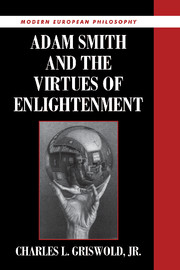Book contents
- Frontmatter
- Contents
- Texts and Acknowledgments
- Introduction
- 1 Rhetoric, Method, and System in The Theory of Moral Sentiments
- 2 Sympathy and Selfishness, Imagination and Self
- 3 The Passions, Pleasure, and the Impartial Spectator
- 4 Philosophy and Skepticism
- 5 The Theory of Virtue
- 6 Justice
- 7 The Moral Sentiments and The Wealth of Nations
- 8 Philosophy, Imagination, and the Fragility of Beauty: On Reconciliation with Nature
- Epilogue
- Bibliography
- Index
8 - Philosophy, Imagination, and the Fragility of Beauty: On Reconciliation with Nature
Published online by Cambridge University Press: 10 November 2009
- Frontmatter
- Contents
- Texts and Acknowledgments
- Introduction
- 1 Rhetoric, Method, and System in The Theory of Moral Sentiments
- 2 Sympathy and Selfishness, Imagination and Self
- 3 The Passions, Pleasure, and the Impartial Spectator
- 4 Philosophy and Skepticism
- 5 The Theory of Virtue
- 6 Justice
- 7 The Moral Sentiments and The Wealth of Nations
- 8 Philosophy, Imagination, and the Fragility of Beauty: On Reconciliation with Nature
- Epilogue
- Bibliography
- Index
Summary
First, it is clear that all human affairs, like the Sileni of Alcibiades, have two aspects quite different from each other. Hence, what appears “at first blush” (as they say) to be death, will, if you examine it more closely, turn out to be life; conversely, life will turn out to be death; beauty will become ugliness; riches will turn to poverty; notoriety will become fame; learning will be ignorance; strength, weakness; noble birth will be ignoble; joy will become sadness; success, failure; friendship, enmity; what is helpful will seem harmful; in brief, you will find everything suddenly reversed if you open up the Silenus.
Desiderius ErasmusTHE NATURE OF NATURE
Virtually all of the ancient schools, whether philosophical or antiphilosophical, sought to ground their ethical and political theories in “nature.” This included “human nature” (as distinguished from human beings as convention has shaped them) though often understood within a larger whole or ethically relevant framework. Book X of the Laws contains one of Plato's strongest statements to the effect that nature, in the sense of the whole, is governed by reason (personified by the gods) rather than by chance or any human art (i.e., convention). We are enjoined to live according to nature, that is, to subject our self-love to the perspective of reason, or “the life of the whole” (903c). In the Gorgias Callicles forcefully appeals to nature (as opposed to convention) in arguing that the strong should rule (483a–e).
- Type
- Chapter
- Information
- Adam Smith and the Virtues of Enlightenment , pp. 311 - 354Publisher: Cambridge University PressPrint publication year: 1998



